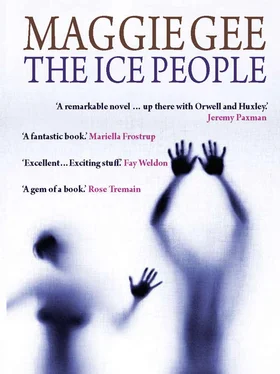Maggie Gee - The Ice People
Здесь есть возможность читать онлайн «Maggie Gee - The Ice People» весь текст электронной книги совершенно бесплатно (целиком полную версию без сокращений). В некоторых случаях можно слушать аудио, скачать через торрент в формате fb2 и присутствует краткое содержание. Год выпуска: 2008, Издательство: Telegram Books, Жанр: Фантастика и фэнтези, на английском языке. Описание произведения, (предисловие) а так же отзывы посетителей доступны на портале библиотеки ЛибКат.
- Название:The Ice People
- Автор:
- Издательство:Telegram Books
- Жанр:
- Год:2008
- ISBN:нет данных
- Рейтинг книги:4 / 5. Голосов: 1
-
Избранное:Добавить в избранное
- Отзывы:
-
Ваша оценка:
- 80
- 1
- 2
- 3
- 4
- 5
The Ice People: краткое содержание, описание и аннотация
Предлагаем к чтению аннотацию, описание, краткое содержание или предисловие (зависит от того, что написал сам автор книги «The Ice People»). Если вы не нашли необходимую информацию о книге — напишите в комментариях, мы постараемся отыскать её.
imagines an ice age enveloping the Northern Hemisphere. It is Africa’s relative warmth that offers a last hope to northerly survivors. As relationships between men and women break down, the novel charts one man’s struggle to save his alienated son and bring him to the south and to salvation.
Maggie Gee
The White Family
The Flood
The Ice People — читать онлайн бесплатно полную книгу (весь текст) целиком
Ниже представлен текст книги, разбитый по страницам. Система сохранения места последней прочитанной страницы, позволяет с удобством читать онлайн бесплатно книгу «The Ice People», без необходимости каждый раз заново искать на чём Вы остановились. Поставьте закладку, и сможете в любой момент перейти на страницу, на которой закончили чтение.
Интервал:
Закладка:
Dora stayed up with me at night through the awful hours before I slept. I was smoking again, which I hadn’t done since Sarah’s affair with that bloody doctor — and when she came back, I gave up for her. Now I smoked again, and tobacco, this time, fullstrength tobacco, industrial strength, imported stuff which cost the earth since hardly anyone in England smoked tobacco — but I wasn’t going to mimsy around with bloody ‘green’ marijuana, which was one of Wicca’s ‘pothecary’ of ‘lifegiving plants’. I smoked tobacco till I pickled myself, snorted like a dragon, thinking grimly of cancer, I’d give myself cancer and she wouldn’t care … but then I’d die, and they would both mourn me, too late they would realise what a man I had been …
But being a man was the basic trouble. What hope was there, if my sex was all that mattered?
It didn’t matter a bit to Dora. I could have been a man, a fish, a clown. She didn’t mind if I smoked, or swore, or drank too much beer, or wept, or farted. She ambled about making faint wheezing noises as she cleaned, gently. (They got that right, the new models weren’t ferocious cleaners, whereas the first Doves were all too like Sarah, who couldn’t clean without screaming and banging about.) So many things were an improvement, though Dora still tended to topple over things and lie there cheeping, her feet in the air. It was worth it, though, for the pleasure you felt when you’d righted her, and she said ‘Thank you’. In fact, Dora said ‘Thank you. I love you’, which I would have thought embarrassing once, but felt quite worryingly touched by, now. (But I couldn’t help thinking — would Dora be unfaithful? Could I ever leave her alone with people? Wouldn’t she love anyone who picked her up? It was just a legacy from living with Sarah.)
Talking to Dora was very rewarding. They’d added some pleasing extra touches. She said ‘Good to see you’ if she came into a room and registered a living presence; when a conversation between us ended, she’d say, in a humble, grateful way, ‘I’ve enjoyed talking to you. Thanks.’ Once again, it was so different from living with Sarah, who hardly listened to me any more because, she said, conversation caused quarrels. If I tried subjects beyond Dora’s understanding (but, of course, she had no understanding: she had a programme — it’s not the same thing) she would say, in a respectful, apologetic way, ‘I’m afraid you’ve lost me. Try again, slowly,’ and when I tried again, if she did no better she’d say ‘I’m so sorry. I’m not up to this,’ and this secondstage response was so thrillingly lifelike that I gazed at her, for a second, enchanted, her big blue eyes, pupils permanently wide, expressing innocent affection, her soft adult voice in that cute baby body … (What would Sarah have said? The first time, ‘I don’t get you.’ Second time, ‘You’re talking balls.’)
That was the point; they were better than us. We wanted them human, but better than us, biddable wives, welltrained children, mothers who never got cross or tired.
And unlike us they would never die. Because of the little ‘Replicate’ panel. I had looked at it many times already, and felt the electric tingle in my fingers drawing me towards it, tempting me. Of course it was tempting to make another being, to see the miracle before my eyes …
But you were cautioned against careless use. It was ‘extremely demanding’ of resources. The Dove would ‘suspend normal functions for the duration of the replication process’. Some of her own material would be recycled for the use of her ‘child’; you were told to expect ‘some longterm lessening of function, change in appearance etc.’ after she had replicated. ‘This does not indicate a malfunction but is part of the normal lifecycle.’
I looked at Dora, sitting on the floor. She looked so new, so adorable, her feathers gleaming, the down on her crown … I moved my finger away from the button. It wasn’t right. She was simply too young. She should enjoy herself a bit, she wasn’t ready for all that yet.
She suddenly chuckled. The ‘chuckle’ was delightful, one of her most appealing new functions, the irrepressible, bubbly, gleeful chuckle of a happy child, and the clever thing was that each time it happened it was slightly different, so it didn’t get boring. It was set on a random programme, so she could chuckle at any time she was switched on, and afterwards she would say, sweetly, ‘I just feel happy’, or ‘Isn’t life fun?’
I had never lived with anyone who I’d managed to make totally, completely happy. I have to admit that when Dora did that, with a little shuddery motion of her wings like a child’s shoulders shaking with laughter, I felt for the first time in many months that I was happy, that life was fun.
I suppose I began to depend on Dora. She wasn’t always Dora; her nickname was Dodo, which suited her somehow, less definitely female than Dora for one thing, more playful and loving, a good name for a bird. I switched her off ‘Sleep’ as soon as I got up in the morning, touched the ‘Follow’ and ‘Conversation’ spots, and she would come waddling into the kitchen and talk to me or play me music.
I started to worry about leaving her at home when I went to the nanolabs in the day. There had been a spate of dovetheft; it was the modish crime, for a while, partly because of the manufacturers’ cannily short runs of each new adaptation. This increased demand to the point where even quite respectable people turned a blind eye if they could get, say, a Culturevulture in decent condition for a favourite child’s birthday.
There were guards, of course, to our building, but all the same, one of them was fairly new, and didn’t they say that security firms often recruited criminals?
Every time I left my Dora, I was anxious. She looked so trusting, so vulnerable, as she padded after me to the door, and said, as I stroked the ‘Goodbye’ panel, ‘Are you leaving? Must you go?’
Are you leaving! Must you go! It felt wonderful, but was she getting too attached?
I was getting too attached, that was the problem.
Luke and Sarah came back one midwinter weekend. She didn’t ring up. She didn’t warn me. Perhaps she was hoping that I’d have gone out, that she could just take their things and go. (Quite a lot of their stuff had already gone, and that in a way was almost a relief, for I could suddenly be reduced to tears by a small pair of sandshoes under the table.)
No, I really think she halfwanted to see me; love doesn’t disappear overnight. Or else she’d have rung up and found out my movements, and arrived when she was sure I was out.
They came late. I had had a curious day, the days that solitary people have, when nothing much happens but your moods veer wildly. The weekends could be frightening when there was no work to do and no one to quarrel with. I missed my son more at weekends. I sat in his room for a bit, stared at the wall, at the posters I had given him of footballers and mountaineers, at the little keyboard he had long outgrown, at his narrow bed, which I’d left unmade because it somehow looked more lived in, more as if he’d just left the flat that morning, though I knew it meant that when Sarah came back she would scream at me for being untidy …
It is a fault in women (particularly ‘sensitive’ ones, sensitive only to their own pain) that they tend to dismiss men as thickheaded clods, and see all our motives as simple and coarse, just because we don’t talk about our feelings. I had feelings for my son. I sat there paralysed. I played some recordings of his voice that she had left lying on his bedside table. His beautiful voice poured through the flat, high, soaring, unforgettable, but I wanted his ordinary daytime voice, asking for a pair of socks, or chocolate.
Читать дальшеИнтервал:
Закладка:
Похожие книги на «The Ice People»
Представляем Вашему вниманию похожие книги на «The Ice People» списком для выбора. Мы отобрали схожую по названию и смыслу литературу в надежде предоставить читателям больше вариантов отыскать новые, интересные, ещё непрочитанные произведения.
Обсуждение, отзывы о книге «The Ice People» и просто собственные мнения читателей. Оставьте ваши комментарии, напишите, что Вы думаете о произведении, его смысле или главных героях. Укажите что конкретно понравилось, а что нет, и почему Вы так считаете.












